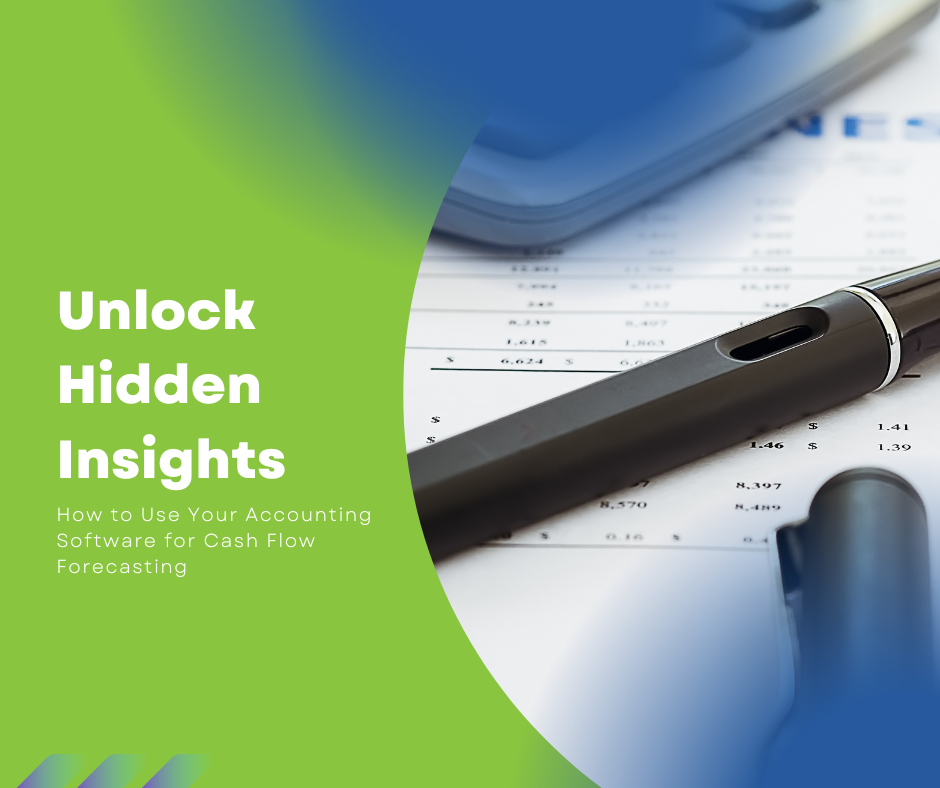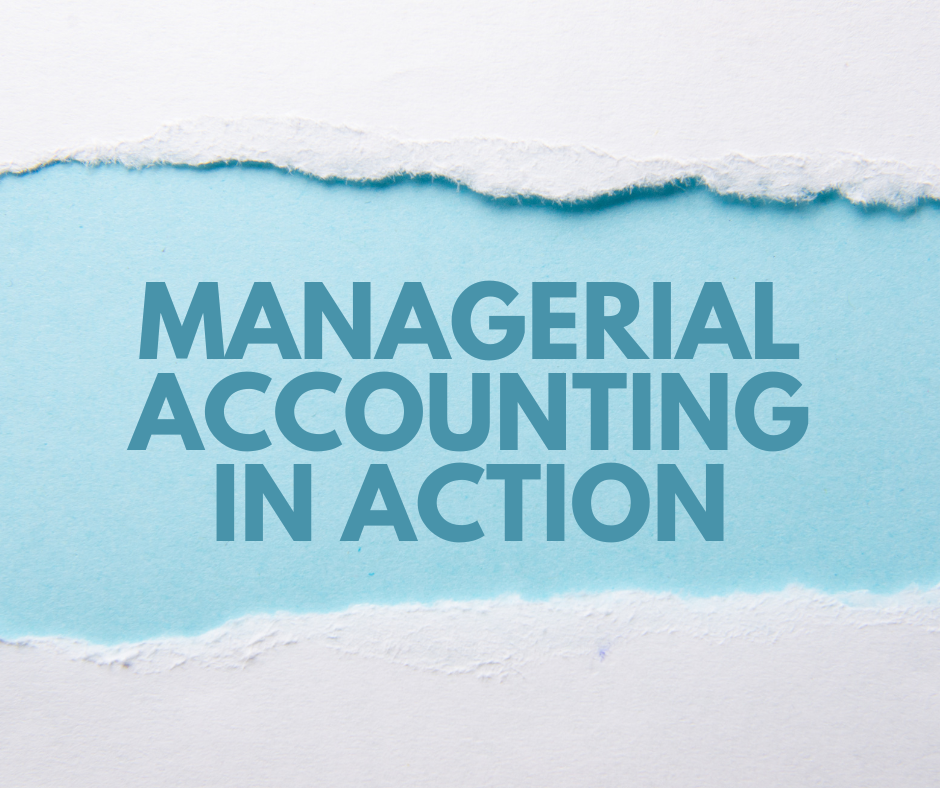What’s The Cost?

In today’s fast-paced business environment, having a handle on your cash flow is more important than ever. Cash flow forecasting helps you anticipate future financial challenges, manage liquidity, and seize opportunities. However, many small businesses overlook a powerful tool right at their fingertips—their accounting software. Most accounting software is packed with features that go beyond tracking income and expenses. One of the most valuable yet underutilized capabilities is cash flow forecasting. By properly leveraging this feature, you can gain deep insights into your future financial position and make better, data-driven decisions. Here’s a step-by-step guide on how to unlock these hidden insights and fully utilize your accounting software for cash flow forecasting. Why Cash Flow Forecasting is Crucial Before diving into how to use your accounting software for forecasting, let’s understand why it’s so critical. Cash flow forecasting allows businesses to: Plan for Growth: Forecasts can reveal whether you'll have the cash to invest in expansion, hire new employees, or launch new projects. Manage Short-Term Needs: Knowing your expected cash balance helps you plan for tax payments, payroll, or short-term borrowing needs. Avoid Crises: Accurate forecasting helps you spot potential cash shortages in advance, enabling you to adjust spending, accelerate receivables, or secure financing before it’s too late. Maximize Opportunities: Cash flow forecasting isn’t just about avoiding problems; it’s also about seizing opportunities when they arise. If you know you’ll have extra cash in the future, you can invest in strategic initiatives or pay down debt. Setting Up Cash Flow Forecasting in Your Accounting Software Understand the Basics of Cash Flow Cash flow can be broken into three categories: Operating Activities: Cash coming in from customers and going out for day-to-day expenses like wages, rent, and utilities. Investing Activities: Cash spent on assets like equipment or real estate, or earned from selling those assets. Financing Activities: Cash from borrowing (loans) or investing (owner contributions), as well as payments to lenders or shareholders. Enable Forecasting Features Some accounting platforms, like QuickBooks, Xero, or Sage, have built-in cash flow forecasting tools, while others allow you to integrate third-party forecasting apps. To get started, explore the “Reports” or “Forecasting” section of your software. Depending on the platform, you may need to enable cash flow forecasting features or link your accounting data to a specialized tool like Float, Fathom, or Futrli. Collect Historical Data Forecasting starts with data from the past. Your accounting software already holds a wealth of historical data—sales, expenses, accounts payable, and accounts receivable. Use this to establish patterns and trends. For instance, if you know that Q4 always sees a spike in sales, you can factor that into your future forecasts. Look at: Revenue Trends: Review how your income has changed over the last year. Are sales seasonal? Do you have major clients with long-term contracts? This helps you project future inflows. Expense Patterns: Analyze your outgoing payments, including fixed costs like rent and variable expenses like materials. Knowing when large bills are due can help you forecast cash outflows. Receivables and Payables: Keep track of when you typically receive payments and when you pay vendors. This timing can significantly impact your cash flow. Input Key Variables Once your historical data is gathered, you need to input key variables into your cash flow forecast, such as: Expected Sales: Based on past sales, growth trends, or upcoming marketing efforts, estimate how much revenue you’ll generate. Future Expenses: Predict how your expenses will change, considering factors like wage increases, new hires, or upcoming large purchases. Receivables and Payables: Set realistic expectations for when you’ll collect payments from customers and when you’ll need to pay vendors. Utilize Advanced Tools in Your Accounting Software Some accounting platforms offer advanced features that can take your forecasting to the next level: Scenario Planning Use scenario planning to build multiple forecasts based on different conditions. For example, what happens if a major client pays late? What if sales drop by 10%? Scenario planning helps you anticipate challenges and prepare for them in advance. Rolling Forecasts A rolling forecast updates automatically as actual results come in. This ensures that your cash flow forecast is always up to date and incorporates new information. Budget vs. Actual Comparison Many accounting systems allow you to compare your forecast with actual performance. This helps you spot discrepancies and refine future forecasts. For instance, if your sales are consistently lower than predicted, you can adjust your forecasts accordingly. Integrating Cash Flow Insights into Business Strategy Once your cash flow forecast is set up, it becomes a powerful tool for guiding your business strategy. Here’s how you can use it for various purposes: Decision-Making on Investments Use your forecast to determine the right time to invest in new equipment, hire staff, or expand operations. Knowing your cash flow position will help you decide whether you can afford these investments or whether you need financing. Debt Management Forecasting allows you to plan for upcoming debt repayments or decide whether to take on new loans. If your forecast shows a cash surplus, you might opt to pay down debt early, saving on interest. Working Capital Management Your forecast will show whether you have enough working capital to cover day-to-day operations. If not, you can take proactive steps to secure financing or negotiate better terms with suppliers. Growth Planning Accurate forecasting is essential for growth planning. If you anticipate a cash surplus, you can reinvest it in the business, whether that’s through marketing, R&D, or new product development. Common Pitfalls to Avoid in Cash Flow Forecasting Overestimating Revenue Ignoring Seasonal Trends Neglecting Payables Not Updating Regularly This Seems Like A LOT! Cash flow forecasting is a game-changer for businesses looking to take control of their finances. By using your accounting software effectively, you can anticipate future cash needs, plan for growth, and make data-driven decisions that lead to long-term success. When cash flow forecasting, financial planning, and managing your accounting system start to feel overwhelming, it’s time to reach out to ProjectLedger Solutions. We specialize in providing expert accounting services and insightful financial analysis that help you navigate the complexities of your business finances. Whether you need help setting up forecasts, automating processes, or making sense of your financial data, our team is here to turn your numbers into actionable insights. Let us take the guesswork out of your accounting so you can focus on growing your business with confidence.

Managerial accounting, also known as management accounting, plays a pivotal role in helping businesses make informed decisions, streamline operations, and achieve financial success. Unlike financial accounting, which focuses on external reporting and compliance, managerial accounting is tailored for internal use, providing managers with vital information for planning, controlling, and directing an organization's operations. This article aims to elucidate the importance of managerial accounting and its substantial impact on a company's success and sustainability. Managerial accounting involves the process of identifying, measuring, analyzing, and interpreting financial information within an organization. This process helps management make decisions that align with the company's strategic goals and objectives. Key components of managerial accounting include budgeting, cost analysis, performance evaluation, and strategic planning. Decision-Making Support Managerial accounting provides critical information and insights to support decision-making within an organization. Managers can use this data to evaluate various options, assess risks, and determine the most suitable course of action. Whether it's expanding operations, investing in new technology, or altering pricing strategies, managerial accounting helps ensure decisions are grounded in accurate financial analysis. Resource Allocation and Budgeting Efficient allocation of resources is crucial for any business. Managerial accounting assists in setting budgets and allocating resources effectively across different departments or projects. By analyzing past performance and forecasting future trends, managers can allocate resources optimally to achieve organizational objectives while maintaining financial stability. Cost Analysis and Control Understanding and managing costs is fundamental to a company's profitability and competitiveness. Managerial accounting helps identify different types of costs (e.g., fixed, variable, direct, indirect) associated with producing goods or services. By analyzing cost patterns and trends, organizations can control and reduce costs, improving overall efficiency and profitability. Performance Evaluation and Improvement Managerial accounting enables organizations to assess the performance of various units, departments, or individuals within the company. By comparing actual results with budgets and targets, managers can identify areas for improvement and take corrective actions to enhance performance and productivity. Strategic Planning and Goal Setting Effective strategic planning is vital for an organization's long-term success. Managerial accounting helps in setting achievable goals based on financial data and analysis. By aligning goals with the company's mission and vision, organizations can create a roadmap to success and monitor progress towards strategic objectives. Enhanced Profitability One of the primary objectives of any business is to generate profits sustainably. Managerial accounting provides insights into the profitability of products, services, or divisions. Through comprehensive profit analysis, organizations can focus on high-margin products or services, adjust pricing strategies, and make informed decisions to enhance overall profitability. Cash Flow Management Maintaining a healthy cash flow is critical for a company's financial stability and growth. Managerial accounting assists in forecasting cash flows based on past trends and upcoming financial obligations. This foresight allows businesses to plan for adequate cash reserves and make strategic financial decisions to meet short-term and long-term financial needs. Risk Management Understanding financial risks and uncertainties is essential for business sustainability. Managerial accounting helps identify and evaluate risks associated with various business activities, enabling proactive risk management strategies to mitigate potential negative impacts on the organization's financial health. To sum it up managerial accounting serves as a cornerstone for effective decision-making, efficient resource allocation, cost control, performance evaluation, strategic planning, profitability enhancement, cash flow management, and risk mitigation. Businesses that prioritize and leverage the power of managerial accounting are better positioned to achieve their objectives, sustain growth, and navigate the dynamic landscape of modern commerce. By recognizing the significance of managerial accounting, organizations can unlock their true potential and drive success in an ever-evolving business environment.



